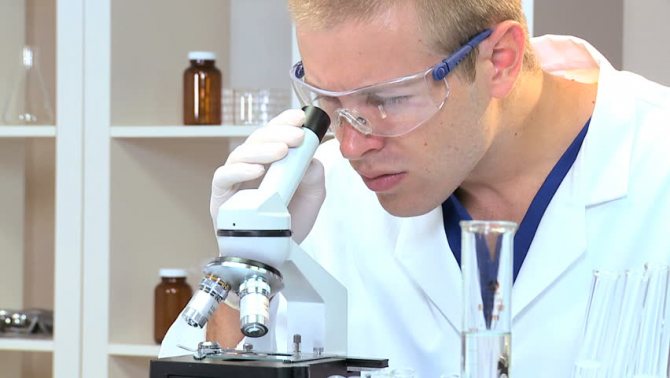Indications for the study
The level of calcitonin synthesis in the thyroid gland is directly proportional to the amount of calcium in the blood plasma.
This hormone has a fairly short half-life - from 2 to 15 minutes. Calcitonin is a functional parathyroid hormone antagonist. Parathyroid hormone promotes the removal of calcium from bone tissue into the blood, accordingly increasing its content in plasma. Calcitonin and parathyroid hormone maintain the body's calcium-phosphorus balance, which plays a critical role in regulating bone density.
It is the effect on calcium metabolism that makes calcitonin analysis extremely important if primary osteoporosis is suspected (in secondary osteoporosis, the hormone level does not decrease). But first of all, a deviation from the norm in the patient’s blood makes it possible to identify malignant neoplasms in the body at an early stage.
Doctors prescribe patients to donate blood for calcitonin in the following cases:
- disturbances of phosphorus-calcium metabolism in the body (most often this may be a consequence of increased or decreased production of parathyroid hormone);
- suspicion of osteoporosis (increased bone fragility, fractures, presence of bone deformities), the analysis is more often prescribed to women, because their risk of osteoporosis is much higher than that of men;
- pheochromocytoma (a tumor most often localized in the adrenal glands and causing significant jumps in blood pressure);
- suspicion of a malignant thyroid tumor - medullary carcinoma, which can cause a significant increase in calcitonin levels. The presence of such a diagnosis in one of the patient’s blood relatives can also serve as an indication for research - to exclude a possible genetic predisposition of the patient to the development of tumors of this type;
- after a diagnosed increase in the size of the thyroid gland and in the presence of nodules on it. Enlarged regional lymph nodes may indicate the need for this test;
- in the process of preparing the patient for surgical removal of a tumor (medullary carcinoma) and during the postoperative period.
Calcitonin is reduced
Calcitonin levels in the blood can reveal many things about cancer patients' health. This is one of those hormones that, even with a slight deviation from the norm, can indicate that health is in great danger. As a rule, oncological diseases are difficult to treat, therefore, it is very important to detect them in the initial stages. A decrease in calcitonin threatens serious problems, therefore, this particular analysis is used to make a diagnosis.
Low calcitonin: causes
A decrease in the level of calcitonin in the blood is not as common a problem as its increase. However, there are reasons for this, and if eliminated, the patient can be cured of the disease. The main reasons for the decrease in calcitonin are:
- The tissue is susceptible to swelling and does not synthesize the hormone, which leads to a level of decline that is directly proportional to the area of the affected tissue;
- Consequence of surgery on the thyroid gland, when part of it was removed;
- Consequences of taking medications that affect hormonal levels (the dose was exceeded);
- The tumor marker has not reached the required level to see diagnostic indicators.
What can low calcitonin lead to?
If the hormone level falls below the required norm, then the first signs of disease may already appear and it is necessary to begin their treatment as soon as possible. If calcitonin is below normal in women, problems may arise during pregnancy. In a normal state, it increases because the development of a new organism inside the body is required. The same applies to feeding a baby, but if at this time the level is low, then complications in the development of the child can lead to pathologies, as well as to a high probability of miscarriage. If calcitonin is low and parathyroid hormone is elevated, this may indicate secondary hyperparathyroidism.
When calcitonin is reduced, cretinism may develop. This disease is associated with an increase in other hormones and can lead to thyrotoxicosis. As a rule, when levels decrease, other thyroid hormones also suffer. When this part of the body ceases to function normally and does not work at full capacity, the body does not receive the hormones it requires. This in turn can lead to dementia. Like many other diseases in this area, they occur more often in women than in men.
Bones may become more fragile. For people who play sports and are more prone to injury than other people, this can be a very serious disadvantage. When understanding what low calcitonin means for them, it is worth highlighting two main points:
- Less resistance of bones to impacts, which can lead to frequent fractures;
- A weak level of recovery, since in a normal state, hormones are activated for bone fusion, whereas with a reduced level of calcitonin in an emergency, it can return to normal and will not give the desired effect.
Deterioration in health is only a symptom, while in fact everything can develop into a more serious nature. After all, this may be a sign of the development of more serious diseases, such as renal failure, primary osteoporosis or hypoparathyroidism. Deterioration in well-being manifests itself in decreased performance. A person gets tired quickly and cannot maintain a normal state throughout the day. In turn, frequent overwork and lack of adequate sleep can lead to a lack of the hormone.
It happens that calcitonin decreases a month after thyroid surgery. This is quite understandable if part of it was removed. When the tissue becomes smaller, the synthesis of the hormone decreases; this may be temporary, since the gland will recover over time and will work properly. But this often means that the level on its own will not return to its proper position and additional treatment will be required. For this, a recovery period is allocated, after which it will become clear how serious everything is.
How to increase calcitonin
For the most minor deviations from the norm, which sometimes happen to many people, a standard recovery procedure is also suitable, with normal sleep, good rest, and a diet with a high calcium content. Getting rid of fatigue will help you restore your health without medications or medications.
Instructions for use of calcitonin
At the same time, drug treatment is very effective and is very often used. Calcitonin is taken in tablets or by injection. Properly selected doses restore hormone levels. Other medications treat the source of the low levels. Surgery is required for large tumors. This happens in the most difficult cases.
Preparatory stage
The patient should properly prepare for a calcitonin test as follows:
- It is necessary to donate blood for analysis on an empty stomach (avoid eating 12 hours before donating blood);
- eliminate fatty, spicy foods from your diet one day before;
- do not take oral contraceptives a month before the test;
- avoid heavy physical activity the day (24 hours) before donating blood for analysis, this also applies to emotional stress;
- immediately before donating blood, a 15-minute rest is advisable;
- You must not smoke 3 hours before the test.
Preparing for a calcitonin test involves the patient minimizing the influence of various factors that can affect the test result. Risk factors include:
- undergoing hormonal therapy with female sex hormones (estrogen);
- taking calcium supplements intravenously;
- alcohol consumption;
- significant physical activity;
- consuming significant amounts of carbohydrates, which increase insulin levels.
Decoding the results
Interpretation of the results obtained is a job only for a specialist; you cannot engage in self-diagnosis based on the obtained conclusion without a medical education. The opinion that average hormone levels should be below zero is incorrect.
Calcitonin levels may deviate from the norm depending on various factors:
- age and gender of the patient: in men they are higher, and over the years the norm decreases;
- individual physiological characteristics of a person;
- analysis methods;
- pregnancy, during which there is more calcitonin in the blood.
Limits of calcitonin normal values
| Floor | Immunoenzyme method pg/ml (picograms per milliliter) | Immunochemiluminescent method pmol/l (picomoles per liter) |
| women | 0,07-12,97 | less than 1.46 |
| men | 0,68-32,26 | less than 2.46 |
| children | up to 70 |
A higher than normal level of calcitonin in a person may mean:

- medullary cancer or C-cell hyperplasia (an increase in the number of thyroid cells due to the acceleration of their neoplasm);
- some types of tumors localized in glandular organs;
- renal failure of various etiologies;
- cirrhosis due to alcohol dependence;
- inflammation of the pancreas (pancreatitis);
- the patient's use of medications containing estrogen or testosterone;
- presence of pregnancy (in the 3rd trimester);
- use of intravenous calcium supplements;
- inflammation of the thyroid gland of various etiologies (thyroiditis);
- bone osteodystrophy - Paget's disease (disturbance of the mechanism of bone tissue restoration);
- megaloblastic anemia;
- Zollinger-Ellison syndrome (tumor lesion of the pancreas with increased secretion of hydrochloric acid).
A decrease in the level of calcitonin in the blood can demonstrate:
- hypoparathyroidism or pseudohypoparathyroidism;
- primary osteoporosis (decreased bone volume);
- insufficient levels of calcitriol synthesized by the kidneys;
- thyroidectomy (removal of the thyroid gland).
High calcitonin
Even small deviations of calcitonin from the norm can indicate the presence of serious diseases. This is especially true for increasing the content of this hormone. High calcitonin, no matter how elevated, requires more serious testing in other areas of the body. After all, one of the diseases that this hormone can show is medullary thyroid cancer.
Calcitonin increase: possible dangers
It is not for nothing that doctors say that any excess of the norm can be serious for health. The fact is that even exceeding 100 mg/ml during tests gives almost complete confidence in the presence of medullary cancer. Each increase in level indicates that the tumor is becoming even more advanced. In advanced stages of the disease, cancer metastases are found in the lymph nodes. This indicates a rather sad prognosis for the patient. When parathyroid hormone is normal and calcitonin is increased, then there is nothing to counteract the increased level and the development of diseases begins.
A number of diseases associated with the thyroid gland, as the main site of hormone production, as well as the kidneys and liver, which depend on its action. Some of them are acute forms of inflammation and are not very difficult to treat, so there is no threat to life. But about half of cases are associated with tumors, some of which are malignant. Here, despite the complexity of surgical intervention and the possible occurrence of relapse, surgical care becomes the only salvation from death.
The hormone calcitonin is elevated: reasons
The reasons that lead to an increase in the level of hormone in the blood are conventionally divided into those caused by a tumor and those caused by non-tumor diseases. Among the tumors it is worth noting:
- Melanoma is a malignant growth of the skin;
- Hyperplasia of the thyroid gland;
- C-cell adenoma of the same gland;
- Breast cancer, which can affect both men and women;
- Ganglioneuroma;
- Gelatoma is a benign tumor that occurs on liver tissue;
- Tumor metastases, which can be found in lymph nodes and other organs;
- Pheochromocytoma is a tumor in the cells of the adrenal glands that produce adrenaline, dopamine and norepinephrine;
- Small cell lung cancer;
- Gastinoma is a tumor that occurs in the gastrointestinal tract, which is also called Zollinger-Elison syndrome or opudoma (in addition to increased calcitonin in the blood, it causes other complications associated with the digestive process);
- Medullary cancer is a malignant tumor of the thyroid gland, which has major complications (calcitonin in medicine is one of the main markers of this disease);
- Medullary within the framework of MEN of the second type.
Elevated calcitonin in the blood can occur for the following reasons not related to the presence of tumors:
- Renal failure in its chronic form;
- Increasing the level of calcium in the blood;
- Complete removal of the thyroid gland, which affects other hormones, which also decrease;
- Graves' disease;
- Hashimoto's disease;
- Various forms of thyroiditis;
- Bronchitis, pneumonia, tuberculosis and other lung diseases that manifest themselves in acute form;
- Pernicious anemia.
You can often see on the forum that calcitonin becomes elevated in people when they are injured. Bone fractures, severe bruises and other things that involve the body's regeneration activate the production of the hormone so that it promotes healing. All this is temporary. If calcitonin is slightly elevated for a long time, then this becomes a serious problem.









